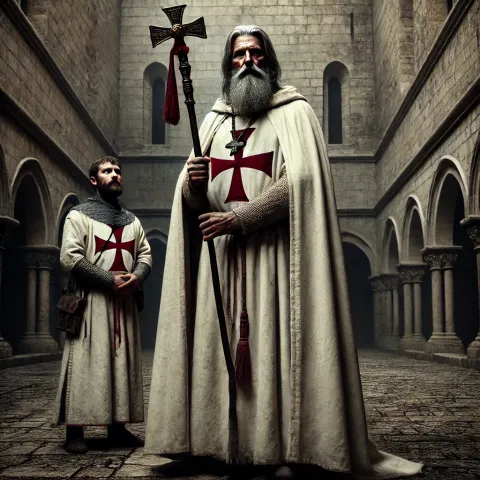
As was testified by his long grey beard, and the shaggy grey eyebrows overhanging eyes, of which, however, years had been unable to quench the fire. A formidable warrior, his thin and severe features retained the soldier’s fierceness of expression; an ascetic bigot, they were no less marked by the emaciation of abstinence, and the spiritual pride of the self-satisfied devotee. Yet with these severer traits of physiognomy, there was mixed somewhat striking and noble, arising, doubtless, from the great part which his high office called upon him to act among monarchs and princes, and from the habitual exercise of supreme authority over the valiant and high-born knights, who were united by the rules of the Order. His stature was tall, and his gait, undepressed by age and toil, was erect and stately. His white mantle was shaped with severe regularity, according to the rule of Saint Bernard himself, being composed of what was then called Burrel cloth, exactly fitted to the size of the wearer, and bearing on the left shoulder the octangular cross peculiar to the Order, formed of red cloth. No vair or ermine decked this garment; but in respect of his age, the Grand Master, as permitted by the rules, wore his doublet lined and trimmed with the softest lambskin, dressed with the wool outwards, which was the nearest approach he could regularly make to the use of fur, then the greatest luxury of dress. In his hand he bore that singular “abacus”, or staff of office, with which Templars are usually represented, having at the upper end a round plate, on which was engraved the cross of the Order, inscribed within a circle or orle, as heralds term it. His companion, who attended on this great personage, had nearly the same dress in all respects, but his extreme deference towards his Superior showed that no other equality subsisted between them. The Preceptor, for such he was in rank, walked not in a line with the Grand Master, but just so far behind that Beaumanoir could speak to him without turning round his head.
“Conrade,” said the Grand Master, “dear companion of my battles and my toils, to thy faithful bosom alone I can confide my sorrows. To thee alone can I tell how oft, since I came to this kingdom, I have desired to be dissolved and to be with the just. Not one object in England hath met mine eye which it could rest upon with pleasure, save the tombs of our brethren, beneath the massive roof of our Temple Church in yonder proud capital. O, valiant Robert de Ros! did I exclaim internally, as I gazed upon these good soldiers of the cross, where they lie sculptured on their sepulchres,—O, worthy William de Mareschal! open your marble cells, and take to your repose a weary brother, who would rather strive with a hundred thousand pagans than witness the decay of our Holy Order!”
“It is but true,” answered Conrade Mont-Fitchet; “it is but too true; and the irregularities of our brethren in England are even more gross than those in France.”